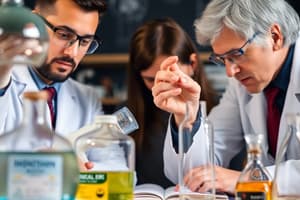Podcast
Questions and Answers
Which of the following best describes the scientific method?
Which of the following best describes the scientific method?
- A way to conduct experiments without questions.
- An iterative process of random guesses.
- A systematic approach to problem-solving through observation and experimentation. (correct)
- A method to confirm pre-existing beliefs.
What is a key characteristic of scientific theories?
What is a key characteristic of scientific theories?
- They are only valid in specific contexts.
- They provide explanations for a wide range of phenomena. (correct)
- They are based solely on anecdotal evidence.
- They cannot be tested or falsified.
What role does peer review play in science?
What role does peer review play in science?
- To provide critical feedback and ensure the quality and credibility of research. (correct)
- To allow scientists to publish their findings without any scrutiny.
- To validate every experiment conducted by a scientist.
- To support only the most known researchers.
Which of the following is NOT a form of scientific inquiry?
Which of the following is NOT a form of scientific inquiry?
Why is falsifiability important in science?
Why is falsifiability important in science?
Flashcards
Science
Science
A systematic process of understanding the natural world through observation, experimentation, and reasoning.
Scientific method
Scientific method
A step-by-step process used in science to investigate a question or problem.
Observation
Observation
The act of noting things using your senses.
Experiment
Experiment
Signup and view all the flashcards
Hypothesis
Hypothesis
Signup and view all the flashcards
Study Notes
What is Science?
- Science is a systematic and logical approach to understanding the natural world.
- It's a process of asking questions, gathering evidence, and developing explanations that can be tested.
Key Characteristics of Science
- Empirical: Science relies on observable evidence and data. Experiments and observations form the basis of scientific knowledge.
- Objective: Science strives to be impartial and free from personal bias. Results should be reproducible by others.
- Testable: Scientific explanations must be formulated in a way that can be tested through experiments or observations. If a hypothesis is not testable, it's not considered scientific.
- Replicable: Experiments and observations should yield the same results when repeated by different researchers. This ensures reliability and validity of the findings.
- Falsifiable: A scientific hypothesis or theory must be stated in a way that it could potentially be proven wrong. If something cannot be disproven, it may not be a scientific hypothesis.
- Parsimonious (or "Occam's Razor"): The simplest explanation that fits the evidence is usually favored.
- Tentative: Scientific knowledge is constantly refined and updated as new evidence emerges. Old theories are sometimes modified or replaced by better ones.
The Scientific Method
- A systematic approach used in scientific inquiry.
- Observation: Identifying a phenomenon worthy of study.
- Question: Formulating a specific question about the observation.
- Hypothesis: A testable explanation for the observed phenomenon.
- Prediction: A specific, measurable outcome expected if the hypothesis is correct.
- Experiment: A controlled procedure to collect data related to the prediction.
- Analysis: Evaluating the data collected in the experiment.
- Conclusion: Determining whether the data supports or refutes the hypothesis. If the hypothesis is not supported, scientists may reformulate the hypothesis or develop a new one.
Branches of Science
- Natural Sciences: Study of the natural world.
- Physical Sciences: Focus on matter and energy (e.g., physics, chemistry, astronomy)
- Life Sciences: Study of living organisms (e.g., biology, ecology, genetics)
- Social Sciences: Study of human behaviour and societies (e.g., psychology, sociology, economics)
- Formal Sciences: Deal with abstract concepts and structures (e.g., mathematics, logic)
Distinguishing Science from Non-Science
- Pseudoscience: Claims presented as scientific but do not adhere to the scientific method.
- Characteristics of Pseudoscience: Lack of falsifiability, reliance on anecdotal evidence, exaggerated claims, appeals to authority, lack of peer review, and use of vague language.
- Examples of pseudoscience include astrology, certain forms of alternative medicine that lack scientific backing, and some creationist views that conflict with established evolutionary biology.
Scientific Attitudes and Ethics
- Critical thinking: Evaluating information objectively and thoroughly.
- Curiosity: Maintaining an interest in understanding the world around us.
- Skepticism: Questioning claims and seeking supporting evidence before accepting them.
- Open-mindedness: Willingness to consider alternative hypotheses and interpretations.
- Integrity: Adhering to ethical principles in research and reporting findings.
- Honesty: Reporting results accurately.
- Transparency: Being clear about methods and data.
The Role of Models and Theories in Science
- Models: Simplified representations of complex systems or processes, allowing for easier understanding and prediction.
- Theories: Well-supported explanations of natural phenomena that unify a wide range of observations and experimental results. They are robust; the more robust a theory, the less likely it is to be drastically revised or overturned. Theories are highly likely to be accurate but are not absolute statements of absolute truth.
Studying That Suits You
Use AI to generate personalized quizzes and flashcards to suit your learning preferences.




